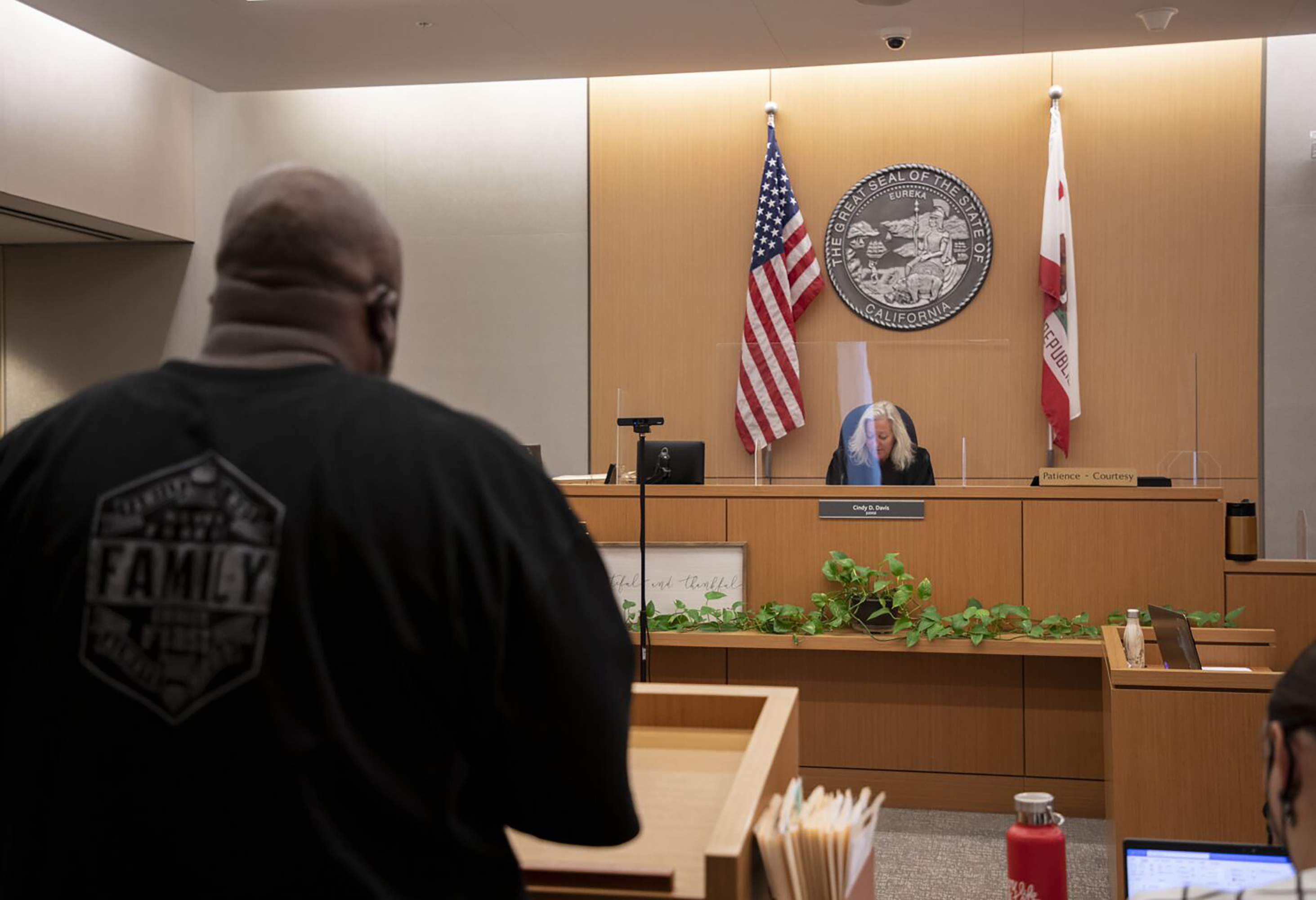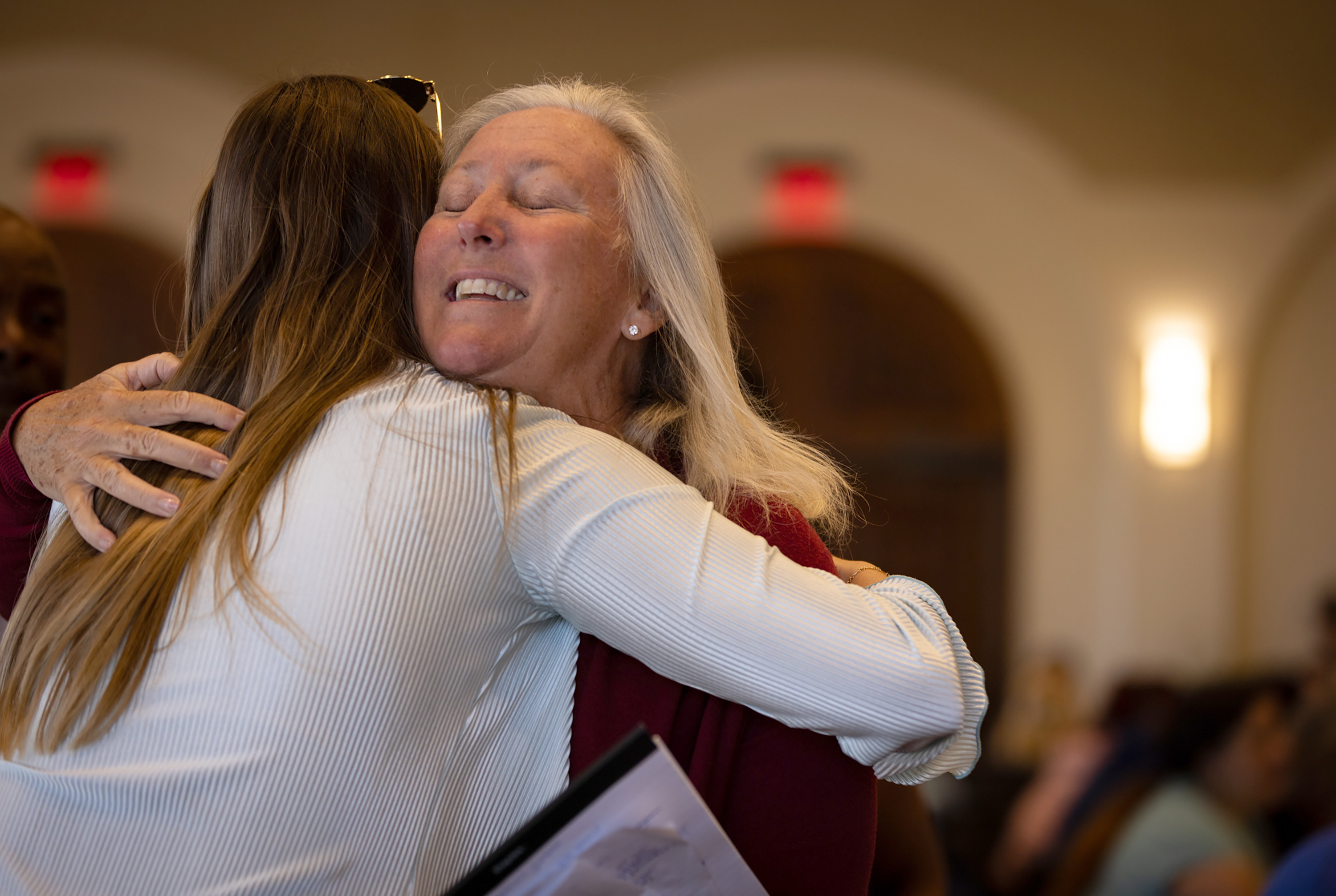From Struggle to Success: Court Graduates Largest Class Yet in Mental Health Program

SAN DIEGO — The man with a magnetic smile beamed as he stared down at the graduation certificate in his hands. It’s coming up on two years since the arrest that landed him in jail.
The arrest, it would turn out, gave him access to what he needed and helped him to earn this framed proof of fortitude.
“Before I got arrested, I was feeling helplessness, and I didn’t know where to get help,” Johannes McCoy said. “So I was really lost, and I ended up going down a bad path. In a way, I am kind of thankful that I went down that path, because I was able to get the help that I needed from this program.”
This week, McCoy became one of the latest to graduate Behavioral Health Court, a specialized San Diego Superior Court program offered to a fraction of felony criminal defendants who have a diagnosis of a serious mental illness — usually schizophrenia, schizoaffective disorder or bipolar disorder.
It’s a collaborative court , one in which prosecutors, defense attorneys, probation officers and treatment providers work together to craft specialized plans for each participant.
It’s a small program — roughly 100 spots — and a very intense one, providing participants with group housing, counseling and wrap-around support, including medication. It runs a minimum of 18 months, although several people need more time. This program offers a chance for participants to stabilize, gives them the tools to navigate life. Failure most likely means a trip back to jail, and for some, prison, to serve time for the crime that landed them here to begin with. Success wipes the conviction clean.

On Monday, McCoy and 25 others gathered to celebrate their completion of the very demanding offering.
The program, McCoy said, “gave me the structure that I needed. They gave me the guidance that I was looking for.”
The cohort of graduates from this spring marks the biggest group since the inception of the collaborative court 16 years ago. Upon entering the program, every individual was dealing with a felony charge. Today, these individuals are advancing their educations and finding employment opportunities. Among them, one participant has joined an auto mechanics course at a nearby junior college, while another is striving towards a master’s degree at San Diego State University.
In spite of its achievements, Behavioral Health Court remains overshadowed.
In recent months, the District Attorney’s Office has been at odds with Judge Cindy Davis, who oversees the program. Prosecutors, displeased with some of her decisions, are pushing Davis to recuse herself from mental health cases. She has refused, save for their first request, although the judge who inherited that case sided with Davis and handed the case back to her.
The ensuing tug-of-war has landed in a state appeals court.
With the behind-the-scenes legal battle, Behavioral Health Court has taken a body blow. No new defendants have been accepted into the program since December. Some 36 participants in the court program remain.
Monday’s celebration, at a luncheon at the University of San Diego, reflected none of that turmoil. Davis spoke to the crowd about the growth and successes of each graduate, highlighting their hard-won victories as they pushed through the requirements and challenges.
She knows each of the participants. Every month they must stand in her courtroom and talk with her, a hearing that serves as a check-in and a guardrail. That, Davis said, is where they “get to travel the journey together.”
This illustrates what truly makes a difference," Davis stated before the assembled group of graduates and their families. The Behavioral Health Court program, according to her, "brings about profound changes." She continued, "I can observe our initial steps and then witness how far we've come. Each one of you fills me with pride, and I am utterly astonished by these remarkable transitions.
In last month’s hearing at the courthouse, two recent graduates appeared before Judge Davis. She cleared their records of the charges that had brought them there. Afterward, Judge Davis embraced both young individuals. One of them was dressed smartly in a suit and even brought along his mother for support.
On Monday, the judge shared tales of individual graduates. She mentioned that one man stood out as a cheerleader for his peers at the group home. Another story was about a woman who faced significant adversity during her tenure in the program yet managed to push through and succeed.
She likewise presented a statement from Deputy Public Defender Melissa Tralla, who is associated with the court but could not make it to Monday’s session. Tralla commended the graduates for their extraordinary persistence.
For those of us who haven't been directly affected by mental health challenges, it’s impossible for us to fully grasp what you're going through," Tralla noted. "From your regular court appearances, you've opened up about encountering auditory commands urging self-harm, witnessing phenomena unseen by others, struggling with substance addictions, coping with marks left from physical and sexual assaults, along with many other distressing life events.
I can't fathom your daily experiences and the challenges this path has presented.
Each graduate took the stage, and most thanked the team who helped them through, a small army of counselors and housing providers and probation officers and more. One graduate shared that he found help through group therapy and people who listen “when there’s the confusing parts of life that I don’t quite understand.”
At the tables, family members sat proudly next to graduates. One brought her children and grandchildren. In the back of the room, 31-year-old Gregory Sizemore sat with his sister, his mother and grandmother. He grinned down at his certificate. His grandmother quietly reached over, put her hand on his knee and smiled.
©2025 The San Diego Union-Tribune. Visit sandiegouniontribune.com. Distributed by Tribune Content Agency, LLC.
Post a Comment for "From Struggle to Success: Court Graduates Largest Class Yet in Mental Health Program"
Post a Comment